20 Hours of Mobile Gaming Enhances Cognition
 A new study found that playing video games for an hour a day, five days per week, for a month produced significant improvements in a player’s ability to track multiple objects and complete visual search tasks. That is just 20 hours of using games that are a lot of fun.
A new study found that playing video games for an hour a day, five days per week, for a month produced significant improvements in a player’s ability to track multiple objects and complete visual search tasks. That is just 20 hours of using games that are a lot of fun.
Researchers looked at the effects of action games and non-action games. The games in the study included: Modern Combat Sandstorms. The Sims3, Bejeweled 2, Memory Matrix and Hidden Expedition Everest.
There are two important aspects of this study for readers of the Next Brain Blog:
- Gaming improves specific cognitive skills on small screens and works in the wild. Participants used their iPhones and did the training outside the laboratory in a real world setting.
- Non-action games, for example Sims3 and Memory Matrix showed some evidence of improving cognitive skills. While this is a preliminary result, it is important for those that don’t like violent games.
I am interested to hear how readers are using their mobile phones to play games or use other apps to improve brain function and cognitive performance.
Categories: College Student, Memory and Learning, Perception Tags: games
Gift Giving Idea: Consider Fat Brain Toys
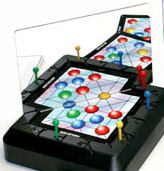 Fat Brain offers an amazing collection of high quality toys and entertainments designed to stimulate the brain and develop cognition. You can shop for toys by gender and ages ranging from 1 year old to 18 years old. From magnetic poetry and brain food (colorful goo) to the best selling stomp rockets and reflections (image shown), a truly unique game that combines mirrors, visual illusion and competition.
Fat Brain offers an amazing collection of high quality toys and entertainments designed to stimulate the brain and develop cognition. You can shop for toys by gender and ages ranging from 1 year old to 18 years old. From magnetic poetry and brain food (colorful goo) to the best selling stomp rockets and reflections (image shown), a truly unique game that combines mirrors, visual illusion and competition.
Just the kind of toys that should be on the holiday shopping list of Next Brain Blog readers. Interested to hear from anyone that has purchased or plays with Fat Brain Toys. How are they making you smarter?
Categories: Child, Cognitive Development, College Student, Mental Focus, Other, Perception, Problem Solving Tags: toys
Playing Scrabble Can Boost Visual Cognition 20%!
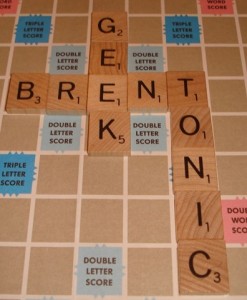 Competitive scrabble players are able to recognize words 20% faster than non scrabble players according to new research from the University of Calgary. More importantly, they found it enhances the cognition you use to recognize words:
Competitive scrabble players are able to recognize words 20% faster than non scrabble players according to new research from the University of Calgary. More importantly, they found it enhances the cognition you use to recognize words:
“The average literate adult relies on three components to process and read a word: sound, spelling and meaning,” says Penny Pexman, professor of Psychology. “When we studied the Scrabble players, we found that there is significant flexibility in the tools they use to read words and that it can include the orientation of the word as well.”
Playing games is one well-known strategy for improving brain function and cognitive performance. Many posts on the Next Brain Blog cover the topic. Trouble is skills developed by game playing are often margin improvements and don’t transfer into new domains. That makes the finding about play Scrabble significant – 20% improvement and it transfers!
I am interested to hear from readers that are getting significant and transferable brain boosts from other games.
Categories: Lifestyle, Memory and Learning, Perception Tags: games
Build a Better Brain by Consciously Listening
The listening and sound expert Julian Treasure has an excellent 8 minute TED Talk video on why we are losing our ability to listen and what to do about it. Of special interest to readers of the Next Brain Blog are the five techniques he offers to improve your ability to listen consciously. These include:
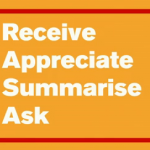 Actively listen to others by practicing RASA or receive, appreciate, summarize and ask questions.
Actively listen to others by practicing RASA or receive, appreciate, summarize and ask questions.- Enjoy 3 minutes of silence or quiet per day to help reset or re-calibrate your listening.
- Count the channels or sources of sound in a noisy environment. For example, walking down a city street you receive sound from a dozen sources including car horns, nearby conversation, buses and so on.
- Change your listen position by adjusting the filters that shape how you hear including for example, expectations and empathy.
- Listen to the hidden choir around you. This involves savoring ordinary sounds, for example hearing the symphony in your tumble dryer.
These five techniques are simple but practicing them will with time transform how you consciously listen. Hearing the world is a key to improved cognitive performance.
Interested to hear from readers that practice specific techniques of conscious listening. What techniques do you use? What have you heard that the rest of have not?
Categories: Lifestyle, Mental Focus, Perception, Training Tags:
Use Your Finger to Crank Your Brain
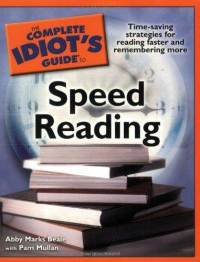 I read faster from paper than I do on a computer screen. With paper I can use my finger to guide my eyes. A well-known speed reading technique, guiding and pacing, lowers the load on your visual system and helps avoid skipping back and other distractions. It is simple and it works. Try it out.
I read faster from paper than I do on a computer screen. With paper I can use my finger to guide my eyes. A well-known speed reading technique, guiding and pacing, lowers the load on your visual system and helps avoid skipping back and other distractions. It is simple and it works. Try it out.
With practice you can drop your finger and still get the effect because your eyes have been retrained. I get some of this effect but am still fastest with good comprehension when I use my finger.
This is just one of the techniques covered in the excellent book, The Complete Idiot’s Guide to Speed Reading.
If you don’t already use these techniques, several weeks of practice will produce a big jump in you reading speed and will likely improve comprehension as well.
Reading speed is important. The difference between a slow reader and an excellent reader means 3 books per week if you read an hour a day.
Very interested to hear from readers that have simple techniques (e.g. use of your finger) to crank your reading speed or other cognitive performances.
Categories: Books, Memory and Learning, Mental Focus, Perception, Training Tags: processing speed, speed reading
Student Reading Skill Doubles in 24 Days
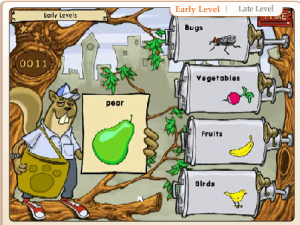 Scientific learning just published the results of a controlled study on Fast ForWord Reading Level 1. This is brain training software designed to boost the abilities of early readers such as students in first and second grade. It build skills with phonemes (sounds) and images, vocabulary knowledge and decoding and sequencing skills and even motivation for reading.
Scientific learning just published the results of a controlled study on Fast ForWord Reading Level 1. This is brain training software designed to boost the abilities of early readers such as students in first and second grade. It build skills with phonemes (sounds) and images, vocabulary knowledge and decoding and sequencing skills and even motivation for reading.
In the study over 200 first and second graders trained 48 minutes per day for 24 school days. When tested against a control group they scored nearly twice as well.
An impressive result especially since it is focused on the fundamental skill of phonological awareness. This involves recognizing, taking apart, adding and moving sounds. It supports high performance in both reading and writing.
Interested to hear from others that use specific techniques to build reading skills in children.
Categories: Child, Perception, Software, Training Tags: speed reading
Music Lessons Offer Lifelong Cognitive Benefits
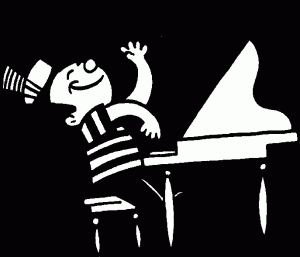 Music is great for the brain in many ways. Learning to play a musical instrument is an excellent investment in improving brain function and cognitive performance. An interesting new study suggests that the brain boost we get from music lessons may last a lifetime. The study reported by the American Psychological Association examined the cognitive performance of adults (ages 60 t0 83) that studied music in childhood.
Music is great for the brain in many ways. Learning to play a musical instrument is an excellent investment in improving brain function and cognitive performance. An interesting new study suggests that the brain boost we get from music lessons may last a lifetime. The study reported by the American Psychological Association examined the cognitive performance of adults (ages 60 t0 83) that studied music in childhood.
“The high-level musicians who had studied the longest performed the best on the cognitive tests, followed by the low-level musicians and non-musicians, revealing a trend relating to years of musical practice. The high-level musicians had statistically significant higher scores than the non-musicians on cognitive tests relating to visuospatial memory, naming objects and cognitive flexibility, or the brain’s ability to adapt to new information.”
While these findings are tentative and require additional research, they do signal that musical training is a powerful tool for building your Next Brain.
Interested to hear from readers that were trained musically as children. How has that shaped your cognitive skills as an adult?
Categories: Child, IQ and EQ, Memory and Learning, Music and Audio, Older Adult, Perception, Problem Solving, Training Tags:
Art Forms as Cognitive Enhancers?
 There is growing scientific evidence that experiencing art both passively and actively can improve brain function and cognitive performance. Art is used as a form of cognitive therapy with older adults and art training is advocated for children by some experts:
There is growing scientific evidence that experiencing art both passively and actively can improve brain function and cognitive performance. Art is used as a form of cognitive therapy with older adults and art training is advocated for children by some experts:
Michael Posner argues that when children find an art form that sustains their interest, the subsequent strengthening of their brains’ attention networks can improve cognition more broadly.
Experiencing art means experiencing beauty which is powerful emotive and intellectual stuff. There are many anecdotal claims that it enhances mental energy, creativity, improves focus and relieves stress.
Some readers of the Next Brain Blog (including myself) have reported success with a very simple art-based technique.
- Find an a new art form that deeply resonates with you. Mine turned out to be the work of Juri Morioka (see sample above).
- Acquire legal, affordable and high quality copies.
- Consciously experience it on a daily or frequent basis.
It is important to find a new art form, not one you have always liked. Also you may need to change the specific pieces you experience periodically to maintain the intensity of the cognitive effects.
Interested to hear from readers that use this or other art-based techniques to enhance brain function and cognitive performance.
Image source: Paintings by Juri Morioka
Categories: Child, Cognitive Decline, Cognitive Development, Lifestyle, Mental Focus, Older Adult, Perception Tags: art
Brain Teaser Made of 216 Tiny Magnets
 There is some evidence that working puzzles and playing certain types of games helps to maintain brain function and improves specific areas of cognitive performance. There are many posts on the Next Brain Blog about such games.
There is some evidence that working puzzles and playing certain types of games helps to maintain brain function and improves specific areas of cognitive performance. There are many posts on the Next Brain Blog about such games.
One I was recently introduced to is made up of 216 small but very powerful magnets that you can recombine into a wide variety of shapes. It is a simple addictive toy. Although I am not aware of any studies on its effectiveness, the idea is to stimulate your brain by thinking up and making fun and interesting shapes. And it seems popular with those interested in brain training. A version of it called, Buckyballs, is a brainy bestseller at Marbles – the brain store.
Working with your hands to make a shape you dreamed up or just play around is a key feature. You accidentally discover cool shapes and learn a little bit about the laws of physics.
Interested to hear from readers about other direct manipulation toys that seem to have a brain boosting effect.
Categories: Mental Focus, Perception, Problem Solving Tags: games
Brain Training Lowers Car Crashes by 50%
 Systematic brain training using software to improve your cognitive performance is a relatively new technique. The software acts like a brain gym working your memory, visual cognition, speed of processing, numeracy, decision-making skills and the like to make them bigger and stronger. More than 10 vendors will sell you a package and program ranging in price from $20 to hundreds. We have covered most of them here on the Next Brain Blog.
Systematic brain training using software to improve your cognitive performance is a relatively new technique. The software acts like a brain gym working your memory, visual cognition, speed of processing, numeracy, decision-making skills and the like to make them bigger and stronger. More than 10 vendors will sell you a package and program ranging in price from $20 to hundreds. We have covered most of them here on the Next Brain Blog.
But does it work? And does it work better than solving crossword puzzles, playing video games or other mentally stimulating things we do for fun? There is compelling evidence that brain training software has impact it is just not clear how much.
So I am always on the lookout for new studies that look at the effectiveness of brain training software. For example, Posit Science recently publish a synopsis of two studies done in 2010. Note Posit Science sells brain training software but the studies were conducted by academic researchers in neuroscience and psychology. These are interesting because both studies show improvement in cognitive performance on tasks outside the training software. One even demonstrated a 50% reduction in at-fault car crashes over a six year period:
“This study looked at crash records for 908 older drivers who trained on a version of Posit Science’s Road Tour exercise six years earlier. Road Tour expands “useful field of view,” how much a person can take in with a single glance. Useful field of view is critical to safe driving: a wider field can help drivers spot dangers in their peripheral vision in time to react. The study authors found that training with the Road Tour technology (called “speed-of-processing training” in the study) cut a driver’s crash risk. In fact, they were responsible for about 50% fewer crashes than their untrained peers. Road Tour is available as part of both the InSight and DriveSharp brain fitness programs.”
This is an important result. It shows that brain training software can improve the cognitive performance of older adults enough to impact an important daily activity.
Interested to hear from readers that use brain training software. How does it improve your cognitive performance in daily life?
Categories: Decision Making, Older Adult, Perception, Software, Training Tags: brain training
